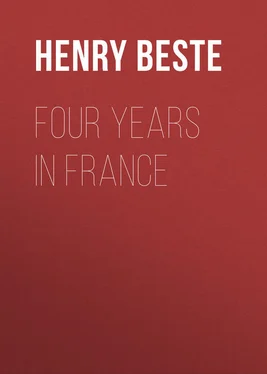Henry Beste - Four Years in France
Здесь есть возможность читать онлайн «Henry Beste - Four Years in France» — ознакомительный отрывок электронной книги совершенно бесплатно, а после прочтения отрывка купить полную версию. В некоторых случаях можно слушать аудио, скачать через торрент в формате fb2 и присутствует краткое содержание. Жанр: foreign_antique, foreign_prose, Путешествия и география, на английском языке. Описание произведения, (предисловие) а так же отзывы посетителей доступны на портале библиотеки ЛибКат.
- Название:Four Years in France
- Автор:
- Жанр:
- Год:неизвестен
- ISBN:нет данных
- Рейтинг книги:4 / 5. Голосов: 1
-
Избранное:Добавить в избранное
- Отзывы:
-
Ваша оценка:
- 80
- 1
- 2
- 3
- 4
- 5
Four Years in France: краткое содержание, описание и аннотация
Предлагаем к чтению аннотацию, описание, краткое содержание или предисловие (зависит от того, что написал сам автор книги «Four Years in France»). Если вы не нашли необходимую информацию о книге — напишите в комментариях, мы постараемся отыскать её.
Four Years in France — читать онлайн ознакомительный отрывок
Ниже представлен текст книги, разбитый по страницам. Система сохранения места последней прочитанной страницы, позволяет с удобством читать онлайн бесплатно книгу «Four Years in France», без необходимости каждый раз заново искать на чём Вы остановились. Поставьте закладку, и сможете в любой момент перейти на страницу, на которой закончили чтение.
Интервал:
Закладка:
One of the heads of the university said to me: "The doctrine of your excellent discourse is clearly the doctrine of the church of England: she asserts the right of absolution to be inherent in her clergy, but the people will not submit to the exercise of the power." This is true; it is true also, that the clergy very prudently abstain, in general, from sounding the inclinations of the people on the subject. My attempt must rather be considered, from the place in which the discourse was delivered, as a sort of concio ad clerum .
I have heard of one clergyman who made the attempt; he preached to his people of the power belonging to him, as a priest, of absolving them from their sins, and of the benefit which they would derive, if truly penitent, from confession and absolution; concluding by fixing a time, at which he would be at home, to hear all those who should have any communications to make to him with such intention. This discourse caused a mighty hubbub in the parish; people did not know what to make of it; some doubted if their clergyman could seriously mean what he had said: one old woman did not hesitate to declare "she would be d – d if she would tell him all she knew." The confusion ceased in due time; but the people neglected to avail themselves of the offer of their pastor.
Some time before, a book had been recommended to me, which I found great difficulty in procuring; at last I found it in the very centre of the fashionable world. I went into Faulder's shop, in Bond Street. "Have you Pluralities Indefensible , by Dr. Newton, founder of Hertford College?" – "It is a book which I always take care to have by me, for the best of all possible reasons, – I am always sure of selling it." – "I should not have supposed that. Who buy it? Any clergymen?" – "Yes." – "What use do they make of it?" Mr. Faulder understood my question. I have forgotten his answer, but it was discreet.
Non-residence on benefices with cure of souls, was one of those abuses in catholic discipline, which, more than any other, tended to bring on the Reformation; it is an abuse which that Reformation has not yet reformed.
I read my book on Pluralities, and was convinced that they were indefensible. Having not yet learned, – perhaps having yet to learn, that "the better part of valour is discretion," – soon after my sermon on absolution, I preached in the same church as before, to a congregation composed as before, a discourse, in which I detailed the evils of pluralities, as necessitating non-residence, and the appointment of "hired substitutes, improperly called curates," to perform those duties, which the principal has engaged to perform, and which, unless disabled, he is in conscience bound to perform personally. This discourse was not heard with the same approbation as the former.
"Religious persuasion" is a phrase bandied about by men who have no very accurate notion of the sense in which they employ the words. One cannot be persuaded of a truth: he may believe that to be true which is not so; but then he judges it to be true, – he is not persuaded; one cannot even be persuaded of a fact; the judgment and the senses are not to be persuaded. In religion, a man either believes, or doubts, or rejects: if he believe, his belief, on account of the supernatural authority to which he submits himself, is called faith. But, if in religion there be sects and parties, he may be persuaded by circumstances to choose one party rather than another; but this is a persuasion that respects the accessaries to religion, not the religion itself. If he adopt or profess the religion, without believing it, he is a hypocrite. I have laid down these principles by which to try my own conduct during my stay in Magdalen College.
If I were conscious of any insincerity in my adherence to the church of England, during this period, I would now declare it; I hold myself bound to tell the truth, and not intentionally to lead the reader into any misapprehension. I had certainly committed a great fault in not prosecuting the inquiry begun by the reading of the Rheims Translation of the New Testament: it was the fault of my boyhood, – a fault of which, on human grounds even, I have but too much cause to repent. By not bringing this inquiry, at that time, to the point to which I afterwards brought it, I lost twelve years of my life, dating from seventeen years old, – a time which might have been employed in diverting my education to other purposes, in adopting and following another profession, and in forming other connexions and friendships, than those which I have, of course, forfeited by my conversion. But, during these twelve years, excepting the last year only, passed in doubt and research, I firmly believed that "the church of Rome had erred, not only in matters of discipline, but also in matters of faith." Transubstantiation was the great stumbling-block; and a church which had erred in so grave a matter was not a teacher to be implicitly confided in. I thought catholics were, not intentionally, but in fact, guilty of idolatry; and I thought the sin pardonable in them on account of the intention. Having once set myself at liberty to reject the authority of the church in communion with the bishop of Rome, I followed, among the various interpretations of which Scripture is capable, that given by the church of England, judging it to be most reasonable. Not sufficiently instructed in the distinction between matters of faith and questions of discipline, I believed the differences and points in dispute between these two portions of the catholic church, to be more numerous than they really are.
Archimedes said, "Give me where to stand, and I will move the earth." At Oxford I was on the peculiar ground, the terra firma , if firm it be, of the church of England: there I could not move or weigh it, or see it at a due distance, to judge of its form or proportion. Indifference was hardly to be obtained amidst so many sympathies. An event however occurred, which removed me to a distance from this scene, leaving my mind free for an investigation which, with the opinions and feelings which my friend, Richard Paget, had taught and infused, and Oxford had confirmed, was soon brought to a fair conclusion.
On the 10th of April, 1797, I received, by an express at ten o'clock in the evening, a letter from a physician at Lincoln, acquainting me with the dangerous state of my mother's health, informing me, that it was hardly probable that on my arrival at her house, I should find her living. In an hour's time I was in a post chaise, and hastened by the shortest road through Northamptonshire. Though obliged to wait at every inn during the night time for fresh horses, and delayed two hours by being overturned, I got to Lincoln, a distance of a hundred and thirty miles, by seven the next evening. My mother had died at the hour at which the express had reached Oxford.
The estate which devolved to me by her death being freehold, my fellowship was not tenable with it. I quitted Magdalen College within three months, sent my books to Lincoln, and established myself there in a mode of life very much according with my former collegiate habits. Before I left Oxford, I acquainted the president of my college with my wish to be appointed to preach the Bampton lecture; he acquiesced, and desired me to write him word when I should be prepared, that he might propose me to the heads of houses, with whom rests the nomination of the lecturer. This institution is so well known, that no account of it here is necessary. The subject of my lecture, as I mentioned to the president, was to be, Christianity proved against the objections of the Jews. Dr. Routh, with that amenity of manners, which distinguishes him as much as his great learning, gave me the titles of several books that might be useful to me.
While meditating the conversion of the Jews, I received one day at dinner a French emigrant priest and an Anglican clergyman. The esprit de son état in the former, and the total absence of it in the latter, were equally remarkable. However, we talked about religion. My Anglican attacked the catholic on account of certain practices which this one easily proved to be common to both communions, the only difference being that the church of England does not observe its own ordinances. The clergyman would not take refuge in the "slow and silent reformation," by which such deviations are usually excused: he knew he should not have me for an auxiliary; he retreated to transubstantiation. Here the Frenchman, who talked English well but not currently, was soon overpowered by two opponents; and the Anglican, his retreat thus covered by me, carried off with him the honour of the day.
Читать дальшеИнтервал:
Закладка:
Похожие книги на «Four Years in France»
Представляем Вашему вниманию похожие книги на «Four Years in France» списком для выбора. Мы отобрали схожую по названию и смыслу литературу в надежде предоставить читателям больше вариантов отыскать новые, интересные, ещё непрочитанные произведения.
Обсуждение, отзывы о книге «Four Years in France» и просто собственные мнения читателей. Оставьте ваши комментарии, напишите, что Вы думаете о произведении, его смысле или главных героях. Укажите что конкретно понравилось, а что нет, и почему Вы так считаете.











